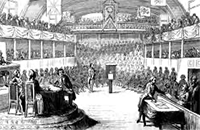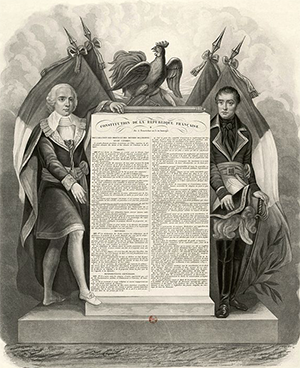|
|

The French Constitution of 1795
|

|
|
Share This Page
|
|
|
|
|
|
|
Follow This Site

|
 |
|
|
|
|

|
The Constitution of 1795 was a governmental blueprint for France that created yet another legislature and yet another executive. It was the third constitution enacted by lawmakers and approved by a referendum in five years.
This document was also known as the Constitution of the Year Ⅲ. The Republican Calendar had set 1793 as Year Ⅰ.

Creating the new Constitution was the National Convention, the ruling legislative body. The Convention wanted to prevent the kind of radical excesses prosecuted by the Montagnards during the Reign of Terror by making the process of enacting legislation slower and more deliberate. As well, the new Constitution contained a few provisions for enabling the central government to maintain control in public and perhaps forestall any attempts at insurrection. The new Constitution gave the government emergency powers that could be activated in order to restrict freedom of association and freedom of the press.
At the same time, the preamble to the Constitution of 1795 was the Declaration of Rights and Duties of Mankind.
On Aug. 22, 1795, the Convention ratified the new Constitution. The new legislature was to have two houses, an upper one called the Council of Ancients (having 250 members) and a lower one called the Council of Five Hundred. In an extreme form of power-sharing, the two councils were forced to work together because the lower house could propose legislation but not pass it and the upper house could only approve or deny legislation. In order to guarantee some continuity, the Convention decreed that at least 500 of the total 750 members must have served in the National Convention. Deputies to the Council of Five Hundred had to be 30 or older; deputies to the Council of Ancient had to 40 or older. Each of the two Councils had a President, who ensured the conducting of business.
Making up the executive branch of the new government was the five-member Directory, the members of which came a from a list provided by the Council of Ancients. Elections for all members of both houses and the Directory would take place every year.
The Constitution of 1795 was the law of the land for four years, until it was replaced by another constitution, which created the Consulate.
Declaration of Rights and Duties of Mankind
The French people proclaim in the presence of the Supreme Being the following declaration of the rights of man and citizen:
Rights
 The rights of man in society are liberty, equality, security, property.
The rights of man in society are liberty, equality, security, property.- Liberty consists in the power to do that which does not injure the rights of others.
- Equality consists in this, that the law is the same for all, whether it protects or punishes.
- Security results from the cooperation of all in order to assure the rights of each.
- Property is the right to enjoy and to dispose of one's goods, income, and the fruit of one's labor and industry.
- The law is the general will expressed by the majority of the citizens or their representatives.
- That which is not forbidden by the law cannot be prevented. No one can be constrained to do that which it does not ordain.
- No one can be summoned into court, accused, arrested, or detained except in the cases determined by the law and according to the forms which it has prescribed.
- Those who incite, promote, sign, execute, or cause to be executed arbitrary acts are guilty and ought to be punished.
- Every severity which may not be necessary to secure the person of a prisoner ought to be severely repressed by the law.
- No one can be tried until after he has been heard or legally summoned.
- The law ought to decree only such penalties as are strictly necessary and proportionate to the offense.
- All treatment which increases the penalty fixed by the law is a crime.
- No law, either civil or criminal, can have retroactive effect.
- Every man can contract his time and his services, but he cannot sell himself nor be sold; his person is not an alienable property.
- Every tax is established for the public utility; it ought to be apportioned among those liable for taxes, according to their means.
- Sovereignty resides essentially in the totality of the citizens.
- No individual nor assembly of part of the citizens can assume the sovereignty.
- No one can without legal delegation exercise any authority or fill any public function.
- Each citizen has a legal right to participate directly or indirectly in the formation of the law and in the selection of the representatives of the people and of the public functionaries.
- The public offices cannot become the property of those who hold them.
- The social guarantee cannot exist if the division of powers is not established, if their limits are not fixed, and if the responsibility of the public functionaries is not assured.
Duties
- The declaration of rights contains the obligations of the legislators; the maintenance of society requires that those who compose it should both know and fulfill their duties.
- All the duties of man and citizen spring from these two principles graven by nature in every heart:
- Not to do to others that which you would not that they should do to you.
- Do continually for others the good that you would wish to receive from them.
- The obligations of each person to society consist in defending it, serving it, living in submission to the laws, and respecting those who are the agents of them.
- No one is a good citizen unless he is a good son, good father, good brother, good friend, good husband.
- No one is a virtuous man unless he is unreservedly and religiously an observer of the laws.
- The one who violates the laws openly declares himself in a state of war with society.
- The one who, without transgressing the laws, eludes them by stratagem or ingenuity wounds the interests of all; he makes himself unworthy of their good will and their esteem.
- It is upon the maintenance of property that the cultivation of the land, all the productions, all means of labor, and the whole social order rest.
- Every citizen owes his services to the fatherland and to the maintenance of liberty, equality, and property whenever the law summons him to defend them.
|
|




 The rights of man in society are liberty, equality, security, property.
The rights of man in society are liberty, equality, security, property.
